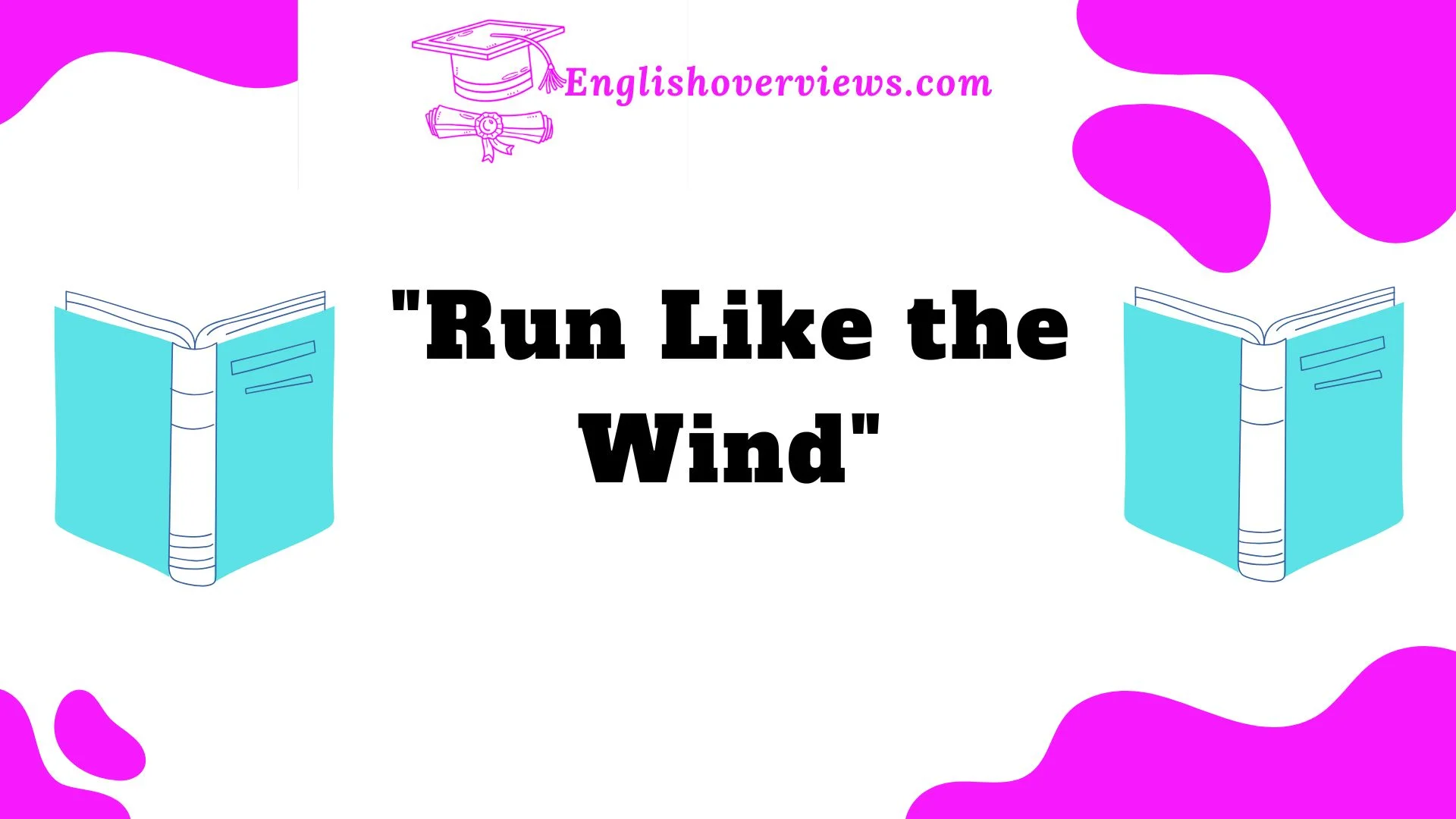Idioms like “Run Like the Wind” add a touch of vivid imagery to our conversations. They make language more colorful, relatable, and engaging. But have you ever stopped to wonder where this phrase came from or why it remains so popular? This expression isn’t just about running fast it carries layers of emotion, urgency, and even storytelling.
From ancient texts to modern-day sports commentaries, “Run Like the Wind” has transcended generations and borders, becoming a universal symbol of speed, determination, and freedom. In this blog post, we’ll uncover the history, significance, and practical use of this idiom in everyday language, literature, and beyond.
We’ll explore:
- Its historical roots and evolution
- Why it’s so impactful as a simile
- Real-world examples and applications
- How literature and pop culture have embraced it
By the end of this article, you’ll not only understand the meaning of “Run Like the Wind” but also appreciate its power to inspire and connect.
Historical Roots: Where Did “Run Like the Wind” Come From?
Origins of the Idiom
The phrase “Run Like the Wind” can be traced back to early English literature. The metaphor likens a person’s speed to the swiftness of the wind, something universally recognized for its unmatched pace and fluid motion.
- First Recorded Usage: While the exact first usage is unclear, idiomatic references to wind and speed can be found in ancient Greek texts and Shakespearean plays.
- Cultural Symbolism: In many cultures, the wind symbolizes power, freedom, and an unstoppable force, aligning perfectly with the imagery of someone running at full speed.
Wind Imagery in Different Cultures
Different cultures have embraced the wind as a symbol:
| Culture | Symbolism of Wind | Common Expressions |
| Greek Mythology | Speed and divine intervention | “Swift as the wind” |
| Japanese Culture | Ephemeral yet powerful | “Like a fleeting breeze” |
| Native American Tribes | Spirit and connection to nature | “Wind whispers strength” |
Evolution Over Time
During the Romantic Era in literature, poets often used wind as a metaphor for freedom and vitality. The phrase gained prominence in the 19th and 20th centuries, finding its way into:
- Classic adventure novels
- War-time speeches emphasizing courage and swiftness
- Modern motivational content and sports commentary
Why It Stuck Around
The simplicity of the comparison made it easy to remember and use across different scenarios. Its association with nature and raw speed ensured its longevity.
Key Takeaway: The idiom has deep roots in storytelling, culture, and emotional expression, which is why it remains timeless.
The Power of Similes: Why “Run Like the Wind” Resonates
Why Similes are Powerful
At its core, “Run Like the Wind” is a simile a comparison using “like” or “as.” But why do similes like this stick with us?
- They create vivid mental images.
- They simplify complex ideas into relatable concepts.
- They make conversations and storytelling more engaging.
Psychological Impact of Similes
Studies show that our brains process similes faster than abstract explanations. When someone says, “He ran like the wind,” your brain instantly visualizes a gust of wind rushing across an open field.
Emotional Connection
The phrase isn’t just about speed; it’s about freedom, urgency, and exhilaration. For example:
- A child sprinting across a playground.
- An athlete breaking records on the track.
- A hero escaping danger in an action movie.
Simile vs. Literal Language
Let’s compare:
| Literal Statement | Simile Statement |
| “He ran very fast.” | “He ran like the wind.” |
| “She finished quickly.” | “She was as swift as the wind.” |
Observation: The simile version evokes stronger imagery and emotion, making it more memorable.
Everyday Relevance
You’ve probably heard it in:
- Sports commentary: “Usain Bolt ran like the wind!”
- Encouragement: “You can do it! Run like the wind!”
- Storytelling: “The knight ran like the wind to save the princess.”
Key Takeaway: Similes like “Run Like the Wind” bridge the gap between words and imagination, making them powerful communication tools.
Figurative Language: Breathing Life into Conversations
Why Figurative Language Matters
Figurative language isn’t just poetic it’s practical. It:
- Makes speech vivid and engaging.
- Helps convey emotion and nuance.
- Allows people to connect on a deeper level.
How “Run Like the Wind” Stands Out
Not every idiom or metaphor becomes timeless. So, what sets this one apart?
- Universality: Wind is a global phenomenon, making the imagery easy to understand.
- Emotion: It carries urgency, power, and speed.
- Adaptability: It fits in casual chats, motivational speeches, and literary works alike.
Examples in Daily Conversations
- Parent to child: “Hurry up, we’re late! Run like the wind!”
- Coach to athlete: “Out there on the track, I want you to run like the wind!”
- In a novel: “The messenger ran like the wind to deliver the critical news.”
Common Alternatives and Their Nuances
| Phrase | Meaning | Best Use Case |
| Bolt like lightning | Extreme speed | Sports, urgency |
| Fast as a cheetah | Animal comparison | Adventure stories |
| Quick as a flash | Instant action | Everyday conversation |
Key Takeaway: Figurative language like “Run Like the Wind” keeps our communication lively and impactful.
Conclusion: The Everlasting Sprint of “Run Like the Wind”
The idiom “Run Like the Wind” isn’t just a phrase it’s a powerful image that transcends generations and cultures. Its historical roots run deep, its emotional resonance remains strong, and its versatility makes it suitable for everything from casual conversations to grand speeches.
Whether it’s motivating an athlete, describing a thrilling escape in a novel, or simply adding flair to a casual chat, this idiom captures the raw essence of speed, determination, and urgency.
In a world where language constantly evolves, expressions like “Run Like the Wind” remind us of the enduring beauty of figurative speech. So, the next time you want to encourage someone to move swiftly or describe an awe-inspiring moment of speed, you know exactly what to say.
Like the wind itself, this phrase will continue to rush through our language, carrying its timeless charm wherever it goes.
FAQs About “Run Like the Wind”
1. What does “Run Like the Wind” mean?
It means to run extremely fast and with great urgency, often implying a sense of freedom, speed, or determination.
2. Where did the phrase “Run Like the Wind” originate?
While the exact origin is unclear, the metaphor has roots in ancient literature and cultural symbolism, where the wind often represented speed and power.
3. Is “Run Like the Wind” a metaphor or a simile?
It’s a simile because it uses the word “like” to compare running speed to the swiftness of the wind.
4. Can “Run Like the Wind” be used in formal writing?
Yes, but it’s more common in creative writing, motivational speeches, and informal contexts due to its vivid imagery.
5. Are there similar idioms to “Run Like the Wind”?
Yes, examples include:
- “Bolt like lightning”
- “Quick as a flash”
- “Fast as a cheetah”
6. How do you use “Run Like the Wind” in a sentence?
Example: “The final whistle blew, and the striker ran like the wind towards the goal.”
7. Is “Run Like the Wind” used in literature?
Absolutely! It frequently appears in novels, poetry, and classic adventure tales to convey speed and urgency.
8. Why is “Run Like the Wind” such a popular phrase?
Its universal imagery, emotional appeal, and simplicity make it memorable and easy to use across different contexts.
9. Are there cultural variations of this idiom?
Yes, many cultures have similar expressions that liken speed to natural phenomena like wind, lightning, or animals.
10. Can “Run Like the Wind” be used metaphorically?
While primarily a simile, it can also be interpreted metaphorically to represent acting quickly or decisively in non-physical scenarios.

Alyan Ashraf is the creative mind behind English Overviews, a platform dedicated to helping learners master the English language. Passionate about education and language development, Alyan specializes in simplifying complex English concepts, making learning accessible for students of all levels.











